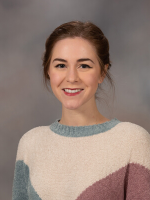National pathologist organization selects M3 for committee service

Mary Clay Bailey, a third–year School of Medicine student, has accepted a historic invitation from the College of America Pathologists to serve in its newly created Pathologist Pipeline Initiative Ad Hoc Committee.
The Batesville native is the first medical student ever to serve on any of the national organization’s committees.
The ad hoc committee was formed to increase the number of medical students choosing a career in pathology, the study of the causes and effects of disease or injury.
Dr. Timothy Allen, UMMC professor and chair of pathology, said although he supported Bailey as the student asked to serve, her attendance and involvement at last fall’s CAP Annual Meeting 2019 brought her to the attention of the CAP team which chose her to represent the student’s perspective.

“I was so honored, I couldn’t believe it,” said Bailey, who expressed her gratitude to Allen and Dr. Debbie Walley, a fourth-year pathology resident who helped Bailey become involved in the CAP. “Without them, this would never have happened.
“I’m very thankful for the connections I have made that have helped me become more involved in pathology. I hope serving on this committee can function as a small way to pay it forward as I work to get more students interested and involved in this incredible field.”
Although she had become interested in pathology earlier, she said her third-year rotation in pathology was a revelation that solidified her interest.
“Many times in the clinical setting, physicians are able to narrow things down to a solid list of differential diagnoses, but it is ultimately up to the pathologist to deliver a definitive answer,” Bailey said. “My experiences during my third year clinical rotations have made it evident to me just how heavily physicians in other specialties rely on the pathologists’ answer.
“It is a pivotal role in health care, and it ultimately impacts the treatment of the patient.
“Another thing I have realized while completing my clinical rotations is that there is a need for more pathologists. Student involvement is key, and I believe that if more students were exposed to pathology and got to see what all this specialty has to offer, that would help.
“One way to address that is to make well-known all the opportunities available through the CAP, such as student travel grants, which allow students to attend the annual meetings and present research.”
The pipeline committee, which will conduct its business by conference calls, is chaired by Dr. Donald Karcher, a member of the CAP Board of Governors and chair of the CAP Council on Education.


